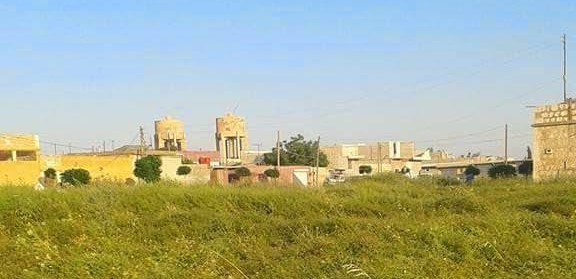
Afrinpost
“The Olive Oil in Your Local Store May Be Funding Syrian Warlords.” Under this heading, Matthew Petti wrote an investigation published by the American Daily Beast on 11/23/2020 about the theft of Afrin oil, and its arrival in stores in the United States of America, A group of questions was asked, and it indicated, through the investigation, the lenient policy of the White House with Ankara, which supported the armed militias in the aggression and occupation of Afrin.
President Trump indulgence
Matthew Petti begins the investigation by saying, “There is a loophole in US sanctions that allows violent militias to transport stolen olives from Syria to processing in Turkey and then export it to American stores.”
American journalist Meghan Bodette says that Turkish forces invaded Syria twice with a personal green light from President Trump, and the pro-Turkey militias, accused of plundering the Kurdish-majority areas under their occupation. The newspaper reached information from multiple sources that the Turkish-backed “warlords” are taxing local farmers, extorting them and stealing their olive crops. Thanks to the Trump administration’s policy, militias can now take advantage of olive oil sold on US store shelves, without being affected by strict US economic sanctions on Syria.
The newspaper points out that the Trump administration imposed sanctions on the “Syrian National Army”, in parallel with American officials praising Turkey’s operations in Syria as an important counter to Russian influence, and that elements of the “Syrian National Army” received American support within the framework of the campaign to combat “ISIS” and a secret program of the intelligence agency Central to undermine the Syrian government.
Treasury and State Department spokesmen declined to comment, citing policies against talking about “potential sanctions.”
Warlords are oil dealers
Turkey invaded Afrin in January 2018 as part of a military campaign, and handed over the area to a coalition of Islamic fighters called the Syrian National Army. These militias have been accused of war crimes, from looting and human trafficking to ethnic cleansing and torture, by the United Nations and the US government. Operations were funded by controlling the olive industry in Afrin, with Turkey’s help.
In its investigation, the newspaper found that the olives that were stolen by what they called “the Syrian warlords” used to finance their combat units, were smuggled into Europe and used to produce high-quality olive oil. From there it is sold and stored in grocery stores in America, from Syracuse to the small town of Massachusetts, to the suburbs of Atlanta, Georgia.
Turkey and the Syrian National Army militias occupy the remaining olive industry in Afrin with an iron fist. Farmers are prevented from selling their produce on the open market and must hand over a large portion of their harvest to warlords, as the Asia Times first reported last year.
Warlords impose “fees” on landowners to export olives or even access their lands, in addition to imposing a tax on trees. “Fees” vary according to the militia, but one thing is constant: the farmers are forced to sell their products to Turkish-backed entities at low prices.
The newspaper’s attempts to track down the source of olive oil reveal a mysterious world of militia leaders and middlemen who profit from Afrin farmers. Four sources from the region reported that it is now impossible for olives to leave Afrin without the approval of the “warlords”.
While the Turkish-backed authorities in Afrin do not protect farmers from the predatory olive trade, it is possible that the Trump administration will help through US sanctions laws that could give the government tools to stop “transactions with a Syrian entity involved in activities contrary to US foreign policy,” Matthew said. Toshband, adviser to Orient Fox, a former deputy chief advisor in the US Treasury’s Office of Foreign Assets Control.
Turkish deal and confirmation
Last Thursday, members of the Turkish opposition and representatives of Turkish industry accused their country’s agricultural bank of traveling to New York to try to market the stolen olive oil in the United States, according to Ahval. And they were apparently unaware that the product had actually hit small shops on this side of the Atlantic.
We want Afrin’s revenues, one way or another, in our hands. Turkey’s Agriculture Minister Bekir Pekdemirli told Parliament in November 2018: This is an area under our control. “We, as a government, do not want the revenues to fall into the hands of [left-wing Kurdish fighters].” Soon after Pekdemirli’s speech, European politicians and representatives of the Turkish olive industry complained about the thousands of tons of “looted” Afrin olives into international markets, which was described falsely as Turkish olives.
Who is the supplier of the fake label?
The newspaper tried to track down the source of the oil that reached the American stores, and found that the oil was coming to the east coast from Afrin.
Turkana Food, a Turkish food import company based in New Jersey, announced “Afrin Olive Oil” in its online wholesale catalog. The font on the label resembles the logo on a trademark application filed in Hatay, Turkey, near the Syrian border, under an unknown name last year.
Aziz, director of the Abu Al-Ezz Halal market in Lowell, confirmed to the newspaper’s website that the olive oil was “transferred” from Syria to Turkey, but denied knowledge of the situation in Afrin. Several Turkana Food employees said they were not authorized to speak to the press over the phone, and the company did not respond to email requests for comment.
The packages has the registered address of Syrian-Danish businessman Aref Hamid, who also sells Afrin olive oil in Europe under the brand name “Kafarajneh”. But Hamid confirms that the source of his olives is known in Afrin and is called Azad Sheikho, and he is marketing it in Europe under the trademark “Kafarajneh”, but he denied selling it to the United States through Turkana Food.
The newspaper contacted, via WhatsApp, the merchant Azad Sheikho in Afrin, and he admitted to exporting it to Europe under the brand name Kafarajneh. But both men denied doing business with Turkana Food, and speculated that the label on Afrin olive oil bottles could be forged. Thus, the Turkish role in Afrin is a controversial topic in the Syrian diaspora and among the Kurds.
Suleiman Rasho, Sheikho’s former business partner, who owns a Syrian trademark for Afrin olive oil, also denied to the newspaper “dealing with the Turks” and claimed that the bottles may be forged. He blamed unknown people in Turkey for stealing his trademark. An employee at Al-Qudus Bakery in the Atlanta suburb Roswell confirmed that their shop contained Afrin olive oil, but said she did not know where it was from.
Testimonies of Kurdish citizens from Afrin
The report states that a Kurdish citizen from Afrin, Nidal Sheikho, feels pain, sadness and heartbreak when he finds a package of stolen Afrin oil in an American store in Syracuse, upstate New York, bearing the Turkana sign. Sheikho, who now lives in upstate New York, said: “I felt pain, sadness and heartbreak,” My eyes tear because of the injustice my city has been subjected to, Afrin. Long live Afrin. Long live the holy city of Olives.
Shekho’s experience is not exceptional. Avrin Hawar (a pseudonym), a Kurdish citizen who owns an olive field, told the newspaper: “This season’s harvest was a nightmare. “By God, most of the season was stolen,” she adds. “I am deprived of my livelihood.” “It is worse than theft, than if they were stealing and exporting olives,” Hawar added. “But everything was stolen from Kurds – hard work, livelihood, effort, dignity, rights from the smallest to the greatest.”
Hajar Seydou, a Syrian-Danish citizen who owns olive trees in Afrin, says: “Our oil that they take from our trees is sold before our eyes, and we are deprived of it, and when I see any businessman who takes oil from Afrin, I feel that it is a stolen wealth.”
According to human rights activist Hassan Hassan, who lost his olive and pomegranate orchards after fleeing the area, and is now running the human rights organization in Afrin from elsewhere in Syria. “It was a family inheritance that I inherited from my father, who in turn inherited it from our ancestors centuries ago,” Hassan wrote in a text message, claiming that his father “later died of grief.” Independent researcher Meghan Bodette discovered the package was produced in April 2019 at a store in Lowell, Massachusetts.






